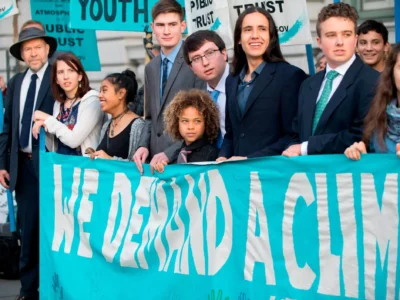Climate Policy and the Audacity of Hope
The barriers are still huge — but we can also envision a path to success.
The bad news is that we’re not yet on track to avoid dangerous climate change. But there’s also good news: We’ve taken important steps that will ease further progress. We should resist the allure of easy optimism, given the scale of the challenges. Neither should we wallow in despair. There’s a good basis for hope.
To begin with, there’s been major progress in U.S. climate policy. The first half of Biden’s term saw the passage of three bills that collectively devote about half a trillion dollars to emission reduction: the Infrastructure Law’s support for emission cuts in transportation, the CHIPS Act with research and development funding for clean energy technologies, and the IRA, with $369 billion for renewable energy and emission cuts. Fourteen states now have net-zero emissions targets for the economy as a whole, and sixteen have zero-carbon targets for the grid. California set a 2035 deadline for eliminating gas and diesel cars, and eight other states are following suit. New California legislation will require corporations to disclose their carbon emissions. And this only scratches the surface in terms of all the state initiatives across the country. In short, we’re seeing something like a slimmed-down Green New Deal.
Climate policy has been boosted by dramatic changes in the economics of clean energy. Perhaps the most important development of the past decade has been the dramatic decline in the cost of renewables. Wind power costs fell by half from 2008 to 2021. Rooftop solar costs in 2020 were a third of what they had been in 2010.. Utility-scale solar was an even more dramatic story. In 2020, the cost of single-axis utility scale solar was only a fifth of what it was in 2010. If car prices had declined equally, the average cost of a new car today would be $7000.
Prices for battery storage have declined even more sharply. The Department of Energy estimates the cost of an electric vehicle lithium-ion battery pack declined 89% between 2008 and 2022. A similar price decline would mean that the average new car today would cost $3500.
There’s no reason to think these trends have bottomed out. In terms of batteries, scientists and engineers are exploring many different battery chemistries, looking not only for lower costs but greater durability and less reliance on rare minerals. Toyota says it’s near mass production of a solid-state battery that will double the range of EVs up to 700 miles with a charging time of 10 minutes or less. But there are many other battery chemistries under consideration, and if Toyota’s doesn’t pan out, one of the others is likely to. Different batteries may be ideal in settings where charging speed is not a factor, such as utility-scale electricity storage.
There’s also a lot of exciting work on solar cells. This is really esoteric stuff — not surprisingly, since photovoltaics are based on quantum physics. UtilityDive reports that “the solar industry is now beginning to make a switch from p-type PERC to n-type tunnel oxide passivated contact, or TOPCon, cells.” In addition, there’s work on layering solar cells. Or in more technical terms: “Multiple junctions — or boundaries between layers of semiconducting materials — allow solar cells to break through the Shockley–Queisser limit, a theoretical limit which prevents single-junction cells from absorbing more than 30% of the solar energy that shines on them.”
I don’t mean to imply that technological progress will automatically fix things. But it does make other things easier. Cheaper renewable energy attracts private investment and makes limits on fossil fuels more feasible. The resulting economic growth also helps create a stronger political base for aggressive expansion of clean energy. With luck, we could find ourselves in a “virtuous cycle” (the opposite of a vicious cycle), where climate progress builds on itself.
We will still need major efforts to phase out fossil fuels and create the physical and institutional infrastructure for a net-zero economy. Yes, there are huge barrier to overcome. But despair is no longer the default option. Let’s dare to imagine a future in which we succeed.








Dan, the overwhelmingly destructive facts of life today are that current chaos on university campuses across the country and failure to motivate the public to demand that politicians implement climate change solutions with the greatest sense of urgency (2050 seems to be the current “no return” best estimate) indicate that our universities are totally failing to deal with highest priority survival of the human race type problems so it is virtually impossible to “imagine a future in which we succeed” unless you eliminate your anti-impure public oath so you can finally dedicate yourselves to protecting the future of the human race, if there really is enough time left.
Techno-optimism is fine but it alone won’t save us – a dramatic readjustment of our relationship to the earth is needed. And that means an end to capitalism as we know it, since it treats Nature as a big box store – all for the taking without thoughts of limits or reciprocity.
Ocean Carbon Dioxide Reduction comprises a number of processes, most to enhance the ocean’s existing biological pathways to increase the amount of carbon sequestered mainly in the ocean deeps. The ocean currently sequesters as much as 38% of human emissions and even marginally increasing that might be a considerable contribution to net zero carbon equivalent emissions.
Interesting that our university system blew up soon after our political system blew up.
So the Durants were right again and Global Warming shall probably destroy our Civilization.
Also interesting is the fact of life that corruption is a common cause for all of these occurrences. Can we overcome global warming in spite of that fact of life?
Universities and political systems are among our most corrupt institutions, the power of money is a higher priority than human life, so the Powers That Be at UC refuse to implement your recommendations for reorganization of environmental resources and we never overcome global warming.
Dan, why did Legal Planet delete your post???:
Where Berkeley falls short, in my view, is that there’s little leadership from the top and little structure at the campus level to organize climate efforts